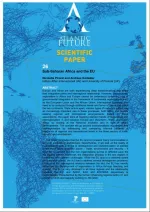Sub-Saharan Africa and the EU

Scientific Paper, nº. 26
Europe and Africa are both experiencing deep transformations that affect their integration paths and interregional relationship. However, contemporary regionalism in Africa and Europe cannot be understood by looking only at governmental integration in the framework of continental organizations such as the European Union and the African Union. Interregional dynamics also need to be analyzed through additional levels and forms of interaction within the two continents. State actors apart, various types of non-state actors play an increasingly important role in these processes, both within and outside existing regional and interregional arrangements. Based on these assumptions, the paper aims at mapping relevant trends of regionalism and interregionalism in and between Europe and (Southern-, West- and East-) Africa, by looking at the historical evolution and in light of recent developments. The analysis will go beyond institutionalized regionalism and interregionalism by addressing and comparing informal patterns of integration at regional and transnational levels in the three sectors of trade; security; and environment.
The paper concludes that the EU and AU present many commonalties in terms of institutional architecture. Nevertheless, if we look at the reality of their achievements in terms of development and implementation of policies in the three fields analyzed above – trade, environment and security – it must be recognized that the two organizations evolve at different pace the AU lagging behind. Moreover, the integration process in the two regions is confronted with different challenges. While the EU acts in a relatively stable and peaceful context, the AU has to address several development problems. In terms of the interregional relations between the two, the EU has heavily influenced the development of regionalism in Africa through teaching and support. The EU is very dominant in all three regions and the relationship between the EU and SADC, EAC and ECOWAS respectively is fundamentally characterized by the former influencing regional policy of, and providing funds and capacity building to, the latter.